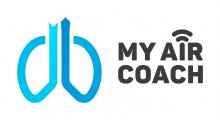MyAirCoach poster sessions at ERS 2016
MyAirCoach poster sessions at ERS 2016

The European Respiratory Society (ERS) International Congress, the biggest event worldwide in the respiratory field, took place this year in London from the 3rd till the 7th of September. MyAirCoach had great visibility at the Congress thanks to the presence of several project partners, the availability of the official project brochure at the World Village and most importantly, two posters which were presented by representatives of the MyAirCoach consortium.
A poster entitled “mHealth systems for asthma self-management: perspectives of people with asthma and healthcare professionals on their use and function” was presented by the University of Manchester during the session Abstracts in medical education, the web and the internet, on Monday the 5th. The objective of the study was to determine the perspectives of individuals with asthma and healthcare professionals on the use of mHealth for asthma self-management.
Through focus groups and questionnaires, 12 potential uses of mHealth were identified and analysed: monitoring of asthma over time and collecting data to present to healthcare teams are the most frequently requested applications of mHealth according to asthma patients, while healthcare professionals would prefer mHealth solutions that alert patients about deteriorating asthma control and advising them when to seek medical attention. Healthcare professionals were more likely to believe that assessing medication adherence and inhaler technique could help patients achieve better asthma control compared to people with asthma. Andrew Simpson explained that “both end-users perspectives are currently being taken into consideration during the development of the MyAirCoach mHealth platform; to ensure that the final outcomes meet the needs and expectations of both people with asthma and healthcare professionals”.
Later, on Tuesday the 6th, the University of Patras presented the “Computational modeling methods for simulating obstructive human lung diseases” during the thematic session “The future of lung function is beginning now”. The poster shows how computational modeling could allow the processing of the patient specific lung geometry and the visualization of the airflow for different kinds of geometry alterations simulating the effects of bronchoconstriction.
In particular, the University of Patras has developed a software tool that combines geometry processing methods with 3D computational fluid dynamics (CFD), allowing to simulate in a realistic way the effects of bronchoconstriction in the dynamics of the air flow in the airways of the lung. The developed tool is expected to provide useful information regarding the way that either drug or other harmful particles are being dispersed inside the lungs during different levels of inflammation. “Such an integrated approach allow us to better understand the pathophysiology behind chronic respiratory diseases, such as asthma & COPD, leading to improved diagnosis and assessment of the patients’ conditions” said senior researcher Aristeidis Lalos.
Both poster sessions received enthusiastic feedback from the chairs of the sessions and from attendees. These intermediate results provide strong support for the mHealth for asthma self-management under development within MyAirCoach and all partners are confident that exciting outcomes will be available for next ERS in Milan.
